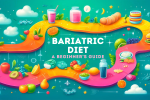
Embark on your transformative journey with confidence. As a bariatric physician with more than three decades of experience, I've had the honor of supporting countless individuals as they navigate their path to weight loss success. While each person's story is distinct, they all share a common theme: the life-changing impact of a carefully designed bariatric diet plan.
After undergoing bariatric surgery, adhering to a specialized diet is essential for your weight loss journey. A well-structured bariatric diet supports your post-surgery recovery, facilitates effective weight loss, and empowers you to maintain your progress in the long run.
Phases of a Bariatric Diet
As your body heals and adapts to its new size, your bariatric diet will evolve through several stages. Here's an overview of what to anticipate:
- Clear Liquids (1-2 days post-surgery): To support your stomach's healing process and maintain hydration, you'll consume clear liquids during this initial phase.
- Full Liquids: Introducing protein shakes and supplements to your diet provides additional nourishment and helps you adjust to reduced portion sizes.
- Pureed Foods (Weeks 3-4): Gradually transitioning to smooth, blended foods allows your body to acclimate to solid food consistencies.
- Soft Foods (Months 2-3): Incorporating soft foods like scrambled eggs and mashed vegetables eases your progression towards a regular diet.
- Regular Bariatric Diet (Month 4 onwards): Enjoy a diverse selection of solid foods, prioritizing lean proteins, fruits, vegetables, and whole grains.
| Stage | Timeline | Key Dietary Guidelines | Nutrients and Supplements | Tips for Success |
|---|---|---|---|---|
| Clear Liquids | 1-2 days after surgery | - Sip clear liquids slowly - Avoid carbonated and caffeinated beverages - Examples: water, clear broth, sugar-free gelatin | - Stay hydrated with at least 64 oz of fluids per day - Avoid sugary drinks | - Sip liquids throughout the day - Listen to your body's hunger and fullness cues |
| Full Liquids | Days 3-14 | - Incorporate bariatric-friendly protein shakes and supplements - Focus on hydration with low-calorie, non-carbonated fluids - Examples: skim milk, protein shakes, strained soups | - Aim for 60-80 grams of protein per day - Take prescribed vitamins and minerals | - Sip liquids slowly and avoid using straws - Drink liquids between meals, not with meals |
| Pureed Foods | Weeks 3-4 | - Consume smooth, blended foods - Prioritize lean protein sources - Introduce pureed fruits and vegetables - Examples: scrambled eggs, pureed chicken, applesauce | - Focus on high-quality protein sources - Include nutrient-dense fruits and vegetables | - Eat slowly and chew thoroughly - Stop eating when feeling full |
| Soft Foods | Months 2-3 | - Transition to soft, easily chewable foods - Incorporate more varied protein sources - Gradually increase fruit and vegetable intake - Examples: moist fish, steamed vegetables, soft fruits | - Aim for 60-80 grams of protein per day - Choose whole grains and high-fiber foods | - Cut food into small pieces - Avoid tough meats and raw vegetables |
| Regular Bariatric Diet | Month 4 and beyond | - Eat balanced meals with lean proteins, fruits, vegetables, and whole grains - Practice portion control and mindful eating - Avoid high-fat and sugary foods - Examples: grilled chicken, roasted vegetables, whole-grain toast | - Meet daily protein and fiber goals - Stay hydrated with water and low-calorie beverages | - Eat small, frequent meals throughout the day - Plan meals and snacks in advance - Keep a food journal to monitor intake |
What to Eat on a Bariatric Diet
The best foods for your bariatric diet are packed with protein and fiber. Think lean meats like chicken and fish, plant-based proteins like beans and nuts, and plenty of fiber-rich fruits and veggies. Whole grains like brown rice and quinoa are great too. Don't forget healthy fats like avocado and olive oil, but use them in moderation.In addition to whole foods, many bariatric patients find it convenient to incorporate specially formulated bariatric products like protein bars and shakes into their diets. These products are designed to provide high-quality protein and essential nutrients in a convenient, easy-to-consume form. Protein bars and shakes can be particularly helpful for meeting daily protein requirements and curbing hunger between meals.
Tips for Bariatric Diet Success
To make your bariatric diet work for you:- Put protein first at every meal. Eating protein before anything else helps you hit your daily goals, keep your muscles strong, and feel full.
- Fill up on fiber. High-fiber foods keep you satisfied and prevent overeating.
- Drink up! Aim for at least 64 ounces of fluids a day to stay hydrated and healthy.
- Steer clear of high-fat and sugary foods. They can slow down weight loss and cause problems.
- Get moving! Exercise helps you maintain your weight loss and feel your best.





